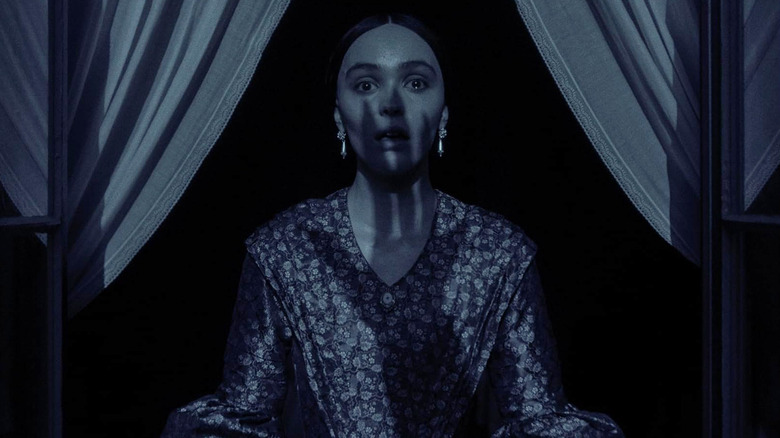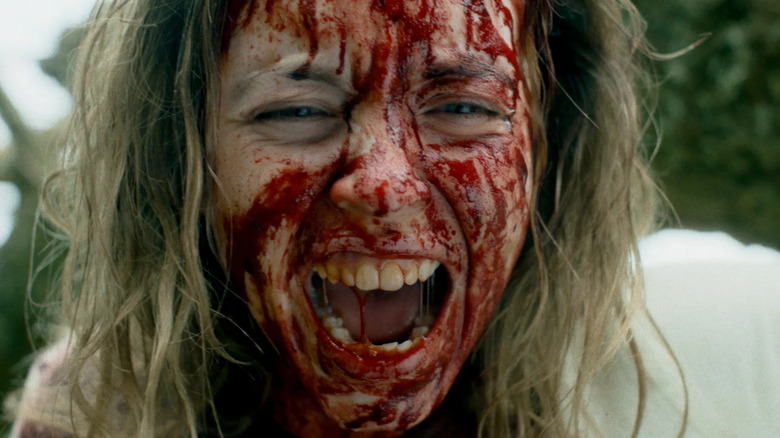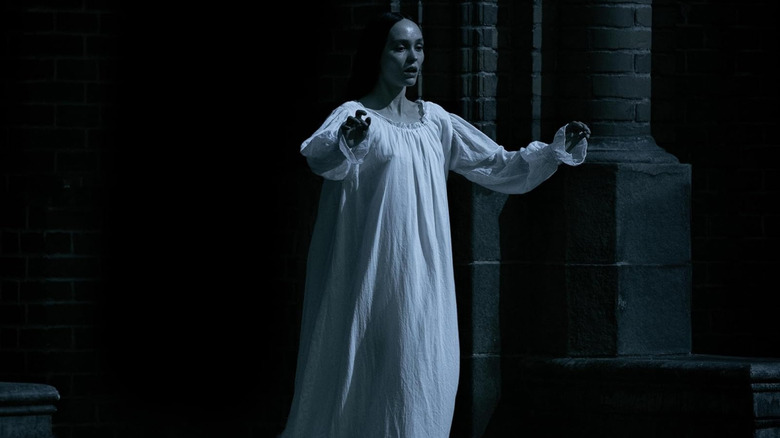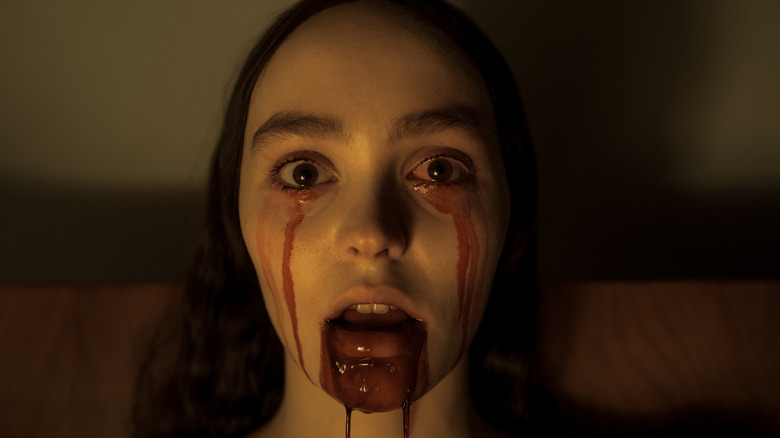
This article contains some spoilers for “Nosferatu.”
For the most part, a trend that emerges during any particular year of cinema doesn’t have anything genuinely competitive about it. Sure, there may be the “Dante’s Peak” and “Volcano,” “Deep Impact” and “Armageddon” years, where highly similar projects are developed to compete with each other, but most trends that occur are less about an intentional duel and are more an indication of where the culture’s head is at. Remember 2017, when a John Denver song turned up in no less than five separate movies? While there’s no one catch-all explanation for such a thing happening, it’s intriguing and potentially illuminating to identify the trend and see what, if anything, it speaks to in the contemporary real world.
When identifying a trend in art, especially cinema, it’s important to remember that films are made on a time delay — the movies of 2024 were shot, for the most part, in 2023, they were conceived even earlier than that, and so on. Additionally, although the news is delivered to us as up-to-the-minute as possible, the effect of life-changing events happen slowly, too. To use a pertinent example, although we received word in 2022 of the overturning of Roe v. Wade, the historic case that allowed women autonomy over their own bodies with regard to unwanted pregnancies, the ramifications of that backwards decision are now starting to crop up everywhere. Hence the trend of horror films in 2024 dealing with unnatural (and very much unwanted) pregnancies, female oppression, female rage, and so on.
It’s perhaps because of this real-life trauma coupled with rising buzz on social media (including news of a high-profile remake) that 1981’s “Possession” has only grown in stature and awareness in the last few years. Andrzej Żuławski’s surreal, histrionic film about the destruction of a marriage (if not a country, and/or the world) contains one of the most iconic portrayals of complex female rage and mental imbalance by actor Isabelle Adjani. Her performance has also inspired a trend amongst the horror films of 2024, culminating with Lily-Rose Depp’s incredible turn in Robert Eggers’ “Nosferatu.”
In ‘Immaculate’ and ‘The First Omen,’ a baby is the catalyst for possession
Adjani’s role in “Possession” is as multifaceted as the film itself. For one thing, it’s a dual role, with Adjani playing both the complex ex-wife Anna and the potential new woman, Helen. For another, Anna is dealing with some mixture of mental illness, emotional trauma, stress, and other factors that cause her to give birth to some … thing in the subway, an organism that eventually matures into something else. That “birthing” scene is the most talked about moment of the whole film, and it’s not only been turned into a meme, but has now been homaged by several horror movies this year alone.
The Nunsploitation one-two punch of “Immaculate” and “The First Omen” earlier this year involve corrupt sects within organized religion (if not society at large) to force women to carry unwanted (not to mention capital-E Evil) children to term. As such, both movies feature a horrific scene of birth and, in the case of “First Omen,” supernaturally sudden pregnancy. Both protagonists, Cecilia (Sydney Sweeney) and Margaret (Nell Tiger Free), have to deal with their bodies being used and changed against their will. In other words, they become possessed, even if we’re talking about a baby rather than a spirit or a demon.
Directors Michael Mohan and Arkasha Stevenson wanted to make their homages to Żuławski explicit; Free is on record saying that she and Stevenson used “Possession” as a reference, and Mohan has stated that he showed Adjani’s subway scene to Sweeney before they filmed the climactic moments of their film. The fact that both films use Adjani and Żuławski as a touchstone, coupled with their go-for-broke performances (which are each indelible in their own way) and the many similarities between “Immaculate” and “The First Omen” would, under other circumstances, be seen as a curious moment of parallel thinking. It’s Lily-Rose Depp’s performance in “Nosferatu” that helps make this examination of female hysteria more of a trend.
‘Nosferatu’ and Lily-Rose Depp redefine hysteria
“Nosferatu” deals with themes distinct from “Immaculate” and “The First Omen,” yet some similarities do crop up. There is no Evil child in “Nosferatu,” yet that doesn’t mean that fears involving pregnancy aren’t in the film. Anna Harding (Emma Corrin), the put-upon friend of Ellen Hutter (Depp) and doting wife of Friedrich (Aaron Taylor-Johnson), happily falls pregnant with the couple’s third child. So, when Ellen’s tormentor/predator/evil lover Count Orlok (Bill Skarsgård) turns his gaze her way, there’s something extra violating about the parasitic Orlok draining both mother and unborn child dry.
However, it’s within the relationship between Orlok and Ellen that the movie’s homage to “Possession” and the trend of histrionic scenes in 2024 horror emerges. In trying to deal with the scourge of Orlok and his arrival in Germany, Ellen confesses to her husband Thomas (Nicholas Hoult) that she has a sordid history with the vampire. She tells Thomas that she’s had dreams — or were they actual encounters? — involving Orlok from a young age, and that these encounters are of a very physical nature. The scene illustrates how much power Orlok has over Ellen while also showcasing Ellen’s own inner darkness, a quality which beckons to her husband, who ends the moment by trying to sexually supplant Orlok in Ellen’s thoughts.
The scene features Depp demonstrating Ellen’s struggle emotionally as well as physically, and it’s the culmination of her character’s suffering from conflicting thoughts and feelings that manifest as some sort of ailment to those not in the know. Through Ellen and Depp’s performance, the film seems to be commenting on the antiquated concept of hysteria, which was once thought to be a disease exclusive to women who would not behave as society (re: patriarchy) would have them do. Like so much social commentary in horror, the film has its cake and eats it, too: Ellen is indeed suffering from the horror of an evil entity invading her mind, yet she’s also dealing with the desires and needs within herself that she won’t publicly admit to, at least initially.
Horror should be a safe space for actors to go wild
The quality Mohan wished to relay to Sweeney when showing her “Possession” while making “Immaculate” was that, in his words, “there is no going over the top.” While it’s probably only coincidence that three horror movies released in 2024 seem to directly pay tribute to Adjani and Żuławski’s film, the trend is more accurately about this principle then any kind of homage-off. More than just these three movies, we’ve had a number of horror films released this year which feature leading female performances that show a remarkable lack of restraint or decorum, which is exactly what these stories, these characters, and this genre demands. As Mohan noted, such unbridled performances “give the audience that sense of catharsis” that we all clearly need in such unsettling and traumatic times.
Such histrionic performances aren’t and shouldn’t be outside the norm for horror. It’s this very ability to strike at our deepest fears, to elicit our strongest (and perhaps most repressed) emotions, and express our basest rage that makes the genre one of the strongest in cinema and, I’d argue, one of the most necessary. In a climate where even a movie set in the fantasy land of Oz is being visually tempered by its director to try and seem more like “a real place,” we need films that boldly eschew constraints of realism in order to release tension and get at the messy, horrible, weird, uncomfortable, and terrifying things we deal with on a daily basis.
Another exciting aspect to this trend is how far it raises the bar for women in horror, which is already a genre that features a slew of legendarily brazen performances. Although the Academy of Motion Pictures Arts and Sciences traditionally doesn’t tend to nominate genre films often, the skill, craft, and bravery on display within horror this year is undeniable, and may make Oscar recognition irresistible. Whether or not these women are recognized with awards, their work will live on, and the precedent they’ve set this year alone means we’re likely in for some very exciting, go-for-broke material in the future. For instance, who knows who might eventually be cast as the female lead in Robert Pattinson and Parker Finn’s remake of “Possession,” but boy, do they have their work cut out for them.
“Nosferatu” is now playing in theaters.





Leave a Reply